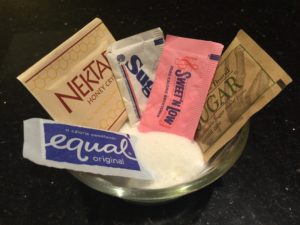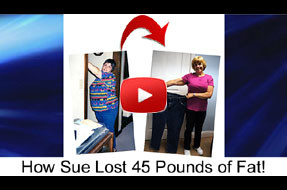Sugar, Sweeteners and Sugar Alcohols
By Daniel F.
One of the most controversial topics in the health and wellness industry is the use of artificial sweeteners and sugar substitutes. First, it is important to understand what exactly we are talking about here.
The term “sugar substitute” is an umbrella term that covers everything that can be used to replace regular table sugar. This includes Artificial Sweeteners, Sugar Alcohols, Novel Sweeteners, and Natural Sweeteners. The following chart from the Mayo Clinic lists the most common sugar substitutes:
|
Artificial sweeteners |
Sugar alcohols |
Novel sweeteners |
Natural sweeteners |
| Acesulfame potassium
(Sunett, Sweet One) |
Erythritol | Stevia extracts
(Pure Via, Truvia) |
Agave nectar |
| Aspartame
(Equal, NutraSweet) |
Hydrogenated starch hydrolysate | Tagatose (Naturlose) | Date sugar |
| Neotame | Isomalt | Trehalose | Fruit juice concentrate |
| Saccharin (SugarTwin, Sweet’N Low) | Lactitol | Honey | |
| Sucralose (Splenda) | Maltitol | Maple syrup | |
| Advantame | Mannitol | Molasses | |
| Sorbitol | |||
| Xylitol |
So, what is the difference between each of these kinds of substitutes, and what are the benefits and/or risks of each?
First, let’s start with artificial sweeteners.
Artificial sweeteners are often used because they are either non-nutritive, meaning they contribute no calories, or they are extremely low calorie. They are sometimes referred to as intense sweeteners because they are many times sweeter than table sugar. The benefit to this is that one needs to use much less to reach the desired level of sweetness that would be obtained with table sugar.
To get an idea of just how much sweeter, the following chart from the FDA breaks it down:
|
Sweetener |
Regulatory Status |
Examples of Brand Names Containing Sweetener |
Multiplier of Sweetness Intensity Compared to Table Sugar (Sucrose) |
Acceptable Daily Intake (ADI) |
Number of Tabletop Sweetener Packets Equivalent to ADI*
|
| Acesulfame Potassium (Ace-K) |
Approved as a sweetener and flavor enhancer in foods generally (except in meat and poultry) | Sweet One® Sunett® |
200 x | 15 | 23 |
| Advantame | Approved as a sweetener and flavor enhancer in foods generally (except in meat and poultry) | 20,000 x | 32.8 | 4,920 | |
| Aspartame | Approved as a sweetener and flavor enhancer in foods generally | Nutrasweet® Equal® Sugar Twin® |
200 x | 50 | 75 |
| Neotame | Approved as a sweetener and flavor enhancer in foods generally (except in meat and poultry) | Newtame®, | 7,000-13,000 x | 0.3 | 23 (sweetness intensity at 10,000 x sucrose) |
| Saccharin | Approved as a sweetener only in certain special dietary foods and as an additive used for certain technological purposes | Sweet and Low® Sweet Twin® Sweet’N Low® Necta Sweet® | 200-700 x | 15 | 45 (sweetness intensity at 400 x sucrose) |
| Siraitia grosvenorii Swingle (Luo Han Guo) fruit extracts (SGFE) | SFGE containing 25%, 45% or 55% Mogroside V is the subject of GRAS notices for specific conditions of use GRAS Notice Inventory |
Nectresse® Monk Fruit in the Raw® PureLo® |
100-250 x | NS*** | ND |
| Certain high purity steviol glycosides purified from the leaves of Stevia rebaudiana (Bertoni) Bertoni | ≥95% pure glycosides
Subject of GRAS notices for specific conditions of use |
Truvia® PureVia® Enliten® |
200-400 x | 4** | 9 (sweetness intensity at 300 x sucrose) |
| Sucralose | Approved as a sweetener in foods generally | Splenda® | 600 x | 5 | 23 |
This intense sweetness greatly reduces the quantity needed in products. There are tons of myths and false information out there concerning the health risks of artificial sweeteners. Because of this, artificial sweeteners have been the most highly scrutinized and studied of all of the sugar substitutes listed. Sucralose alone has had over 110 safety studies done and was scrutinized and reviewed by the FDA before its approval as generally safe for consumption. This article from the National Cancer Institute digs deeper into the Artificial Sweetener/cancer Myths: https://www.cancer.gov/about-cancer/causes-prevention/risk/diet/artificial-sweeteners-fact-sheet. It is taken directly from an unbiased research institute on the study of cancer, not just something you read from Dr. Google.
The FDA also breaks down its stance on the use of each individual artificial sweeteners here: FDA Artificial Sweeteners.
Sugar alcohols are carbohydrates that are found naturally in certain fruits and vegetables. They are not as sweet as artificial sweeteners and are often less sweet than table sugar. Typically, they are used in combination with other sweeteners, such as sugar or artificial sweeteners, but they contain fewer calories per gram than regular sugar. The combination of sugar alcohols and table sugar will lower the total amount of table sugar needed, thereby lowering total calories.
Novel sweeteners are sugar substitutes that are hard to categorize because they are a combination of multiple sweeteners. Stevia is an example of a novel sweetener. What is interesting to note is that the FDA has only approved highly refined stevia, NOT the whole-leaf or crude stevia. So, while advertised as “a natural sweetener,” only the highly processed version of it has been approved. Sugar alcohols can cause some to experience a slight laxative effect, if consumed in large amounts.
Natural Sweeteners are promoted as healthier options than processed table sugar, but their chemical breakdown in the body is almost identical to that of table sugar. Both break down into glucose or fructose which are simple sugars. Natural sweeteners include fruit juices, nectars, honey, molasses, and maple syrup. And although naturally occurring, many natural sweeteners–such as with agave nectar– will undergo quite a bit of processing and refining before being used.
What does this all mean to you or me? Well, to keep it simple, the majority of dietary health-related issues, such as obesity, diabetes, etc., can be traced back to the overconsumption of sugar. So, when we are talking about weight loss and sugar control, a sugar substitute may be a better option, especially non-caloric, non-nutritive sweeteners. In talking with a registered dietician (NOT a nutritionist, and yes there is a huge difference), it was explained to me that using artificial sweeteners in moderation would have an overall health benefit when weight loss is the main goal.
Limiting total sugar intake will have a huge effect on total caloric intake, which is what will lead to weight loss. Hundreds of studies have shown that artificial sweeteners, in moderation, are perfectly safe in humans. What I would caution is when the general population –being inundated with popular myths—decides to jump to the new “natural” sugar substitutes, that have not been studied as in-depth, as the artificial sweeteners listed.
Just as with everything else, there may be people who experience adverse effects to artificial sweeteners (just like there are people who are allergic to peanuts, tomatoes, oranges, etc.) but, if you are not one of those people, then, in general, sweeteners are a way to limit sugar and calorie intake to promote weight loss.
Dan’s journey into fitness began as an overweight youth. Being extremely overweight he took steps to change his life starting with proper nutrition and a little bit of exercise. He attended Clemson University receiving a BS in Management. He spent most of his free time in the rec. center getting hooked on exercise. Upon graduating he moved back to CT and decided to learn everything he could about the fitness industry and how to properly train the human body. He attended The National Personal Training Institute receiving a diploma in personal training and nutrition consultation. After NPTI he participated in a 4 month mentorship to learn the intricacies of training athletes. This is where he found his passion! He has spent the last 4 years training athletes, of all ages. He has extensive experience training athletes from middle-school all the way to the pros, in all sports! He is a certified strength and conditioning specialist, CSCS, through the National Strength and Conditioning Association. He is also has an Advanced Certified Personal Trainer (A-CPT) certification, and is currently working on his Tactical Strength and Conditioning Facilitator certification.






